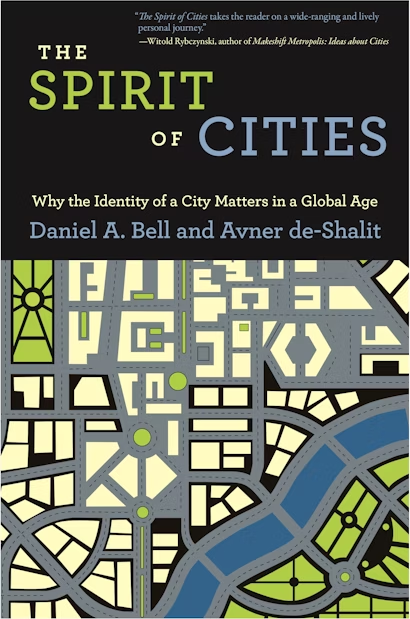Cities shape the lives and outlooks of billions of people, yet they have been overshadowed in contemporary political thought by nation-states, identity groups, and concepts like justice and freedom. The Spirit of Cities revives the classical idea that a city expresses its own distinctive ethos or values. In the ancient world, Athens was synonymous with democracy and Sparta represented military discipline. In this original and engaging book, Daniel Bell and Avner de-Shalit explore how this classical idea can be applied to today’s cities, and they explain why philosophy and the social sciences need to rediscover the spirit of cities.
Bell and de-Shalit look at nine modern cities and the prevailing ethos that distinguishes each one. The cities are Jerusalem (religion), Montreal (language), Singapore (nation building), Hong Kong (materialism), Beijing (political power), Oxford (learning), Berlin (tolerance and intolerance), Paris (romance), and New York (ambition). Bell and de-Shalit draw upon the richly varied histories of each city, as well as novels, poems, biographies, tourist guides, architectural landmarks, and the authors’ own personal reflections and insights. They show how the ethos of each city is expressed in political, cultural, and economic life, and also how pride in a city’s ethos can oppose the homogenizing tendencies of globalization and curb the excesses of nationalism.
The Spirit of Cities is unreservedly impressionistic. Combining strolling and storytelling with cutting-edge theory, the book encourages debate and opens up new avenues of inquiry in philosophy and the social sciences. It is a must-read for lovers of cities everywhere. In a new preface, Bell and de-Shalit further develop their idea of “civicism,” the pride city dwellers feel for their city and its ethos over that of others.
"The affinity and intimacy recalled here inevitably evoke memories of and comparisons to one's own city experiences. The scholarly knowledge is often enlightening and instills the urge to go deeper into many of the urban histories that the authors place in front of the reader. . . . After reading their city portraits, one is inclined to 'stroll' through one's own city with newly opened eyes, ready for surprises and the unraveling of hidden historic layers."—Florian Kossak, Times Higher Education
"For this city lover their book was a passionate, profound and inspiring journey to the heart of the contemporary urban experience."—City-Lit Café
"The call 'city-zens of the world unite' symbolizes the enduring importance of and unique characteristics associated with cities able and willing to withstand the pressures of globalization. Rather than suggesting the rise of uniformity fostered by globalization across cities, Bell and de-Shalit offer a series of fascinating and convincing case studies that counter this view. . . . Personally familiar with Jerusalem, Montreal, Singapore, Hong Kong, Beijing, Oxford, Berlin, Paris, and New York, in their findings the authors describe unique ethes ranging from religious conviction in the case of Jerusalem to ambition in the case of New York."—Choice
"This highly readable book . . . is academically informed but will not strike the general reader as academic."—Sunder Katwala, British Future
"The Spirit of Cities is a strange book, in a good way. . . . [F]ascinating and informative. . . . Bell and de-Shalit have created an admirable study that offers insight into all cities."—Stephan Delbos, Prague Post
"Bell and de-Shalit put forth a provocative thesis, and they present it in a rich brew of insights, anecdotes, and ideas that can benefit anyone with a stake in the urban environment."—Stanley Stark, Oculus
"The book is extremely interesting and entertaining for lovers of cities all over the world, and perhaps even for those who are not, because The Spirit of Cities is quite insightful and takes the reader on a thought-provoking personal journey. Moreover, the style of the book is attractively conversational (even autobiographical). . . . It is also worth mentioning that The Spirit of Cities, combining strolling and storytelling with cutting-edge theory, encourages debate on new ways of inquiry in the social sciences."—Agnieszka Ogrodowczyk, European Spatial Research and Policy
"In a field saturated with superficial rankings and business surveys, The Spirit of Cities represents the triumph of the aesthetic over the commercial. By walking and living in the world's capitals—a novel and admirable methodology that proves more revealing than any theory—Bell and de-Shalit untangle the riddles of our most intriguing cities. This book is as beautiful as it is insightful."—Parag Khanna, author of How to Run the World: Charting a Course to the Next Renaissance
"There aren't many new ideas in political theory, but Daniel Bell and Avner de-Shalit definitely have a new idea, and a good one: that cultivating 'the spirit of cities' is the best antidote to global homogenization. The nine cities that they use as examples are presented with an innovative and engaging mix of personal anecdote, history, and theoretical reflection. They have produced a book that sparkles, which is also something new in political theory."—Michael Walzer, Institute for Advanced Study, Princeton
"While cities are distinguished by their architecture and physical appearance, Bell and de-Shalit make a compelling case that many major world cities—and their inhabitants—also express their own distinctive ethos or values. The Spirit of Cities takes the reader on a wide-ranging and lively personal journey."—Witold Rybczynski, author of Makeshift Metropolis: Ideas about Cities
"The Spirit of Cities presents a new approach to the study of cities in which the focus is placed on a city's defining ethos or values. The style of the book is attractively conversational and even autobiographical, and far from current social science positivism. For a lover of cities—and perhaps even for one who is not—The Spirit of Cities is consistently good reading."—Nathan Glazer, author of From a Cause to a Style: Modernist Architecture's Encounter with the American City
"This book tackles an agenda that has been sorely lacking in modern political philosophy. Its methodology is impressionistic. The result is unclassifiable, though the category that would probably best encompass it is belles lettres. These are essays in the classical sense. In the spirit of Montaigne, they seek to describe a personal and therefore necessarily idiosyncratic perspective. I found the book extremely entertaining to read, and quite insightful throughout."—Daniel Weinstock, Université de Montréal


